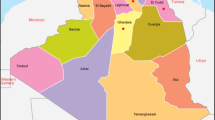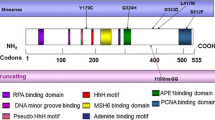Abstract
Introduction
MUTYH-associated polyposis (MAP) is an autosomal recessive cancer predisposition syndrome associated with the development of colorectal tumors and colonic polyps at an early age. MAP syndrome is associated to germline biallelic mutations in the MUTYH gene which lead to deficient DNA repair through the base-excision repair system and accumulation of G:C→T:A transversions. Occurrence of such mutations in oncogenes and tumor suppressor genes drives colorectal carcinogenesis and is associated with the development of colonic polyps. Two common mutations, p.Y179C and p.G396D, are present in approximately 70–80% of MAP in European families with identified MUTYH germline mutations. The aim of this study was to assess the frequency of the germline MUTYH mutations p.Y179C and p.G396D in Brazilian patients with MAP and other hereditary colorectal cancer (CRC) phenotypes, as well as in sporadic CRC cases.
Materials and methods
A total of 75 patients were included. Samples were screened for the MUTYH germline mutations p.Y179C and p.G396D by allelic discrimination assays using allele-specific TaqMan® probes. In all mutation-positive cases, results were confirmed by sequencing.
Results and conclusions
Biallelic germline MUTYH mutations were identified in 4 of 60 (6.6%) patients with a phenotype of hereditary colorectal cancer. Germline MUTYH mutation screening should be considered in the differential diagnosis of hereditary colorectal syndromes, and not only in MAP, but also in familial adenomatous polyposis and Bethesda criteria-positive families. Additional mutation screening studies of the MUTYH gene in a larger number of Brazilian patients will be necessary to confirm these results and determine the validity and applicability of MUTYH mutation screening in our population.

Similar content being viewed by others
References
Al-Tassan N, Chmiel NH, Maynard J et al (2002) Inherited variants of MYH associated with somatic G:C→T:A mutations in colorectal tumors. Nat Genet 30:227–232
David SS, O'Shea VL, Kundu S (2007) Base-excision repair of oxidative DNA damage. Nature 447(7147):941–950
Slupska MM, Baikalov C, Luther WM et al (1996) Cloning and sequencing a human homolog (hMYH) of the Escherichia coli mutY gene whose function is required for the repair of oxidative DNA damage. J Bacteriol 178:3885–3892
Vogt S, Jones N, Christian D et al (2009) Expanded extracolonic tumor spectrum in MUTYH-associated polyposis. Gastroenterology 137:1976–1985
Nielsen M, Franken PF, Reinards TH et al (2005) Multiplicity in polyp count and extracolonic manifestations in 40 Dutch patients with MYH associated polyposis coli (MAP). J Med Genet 42:e54. doi:10.1136/jmg.2005.033217
Wasielewski M, Out AA, Vermeulen J et al (2010) Increased MUTYH mutation frequency among Dutch families with breast cancer and colorectal cancer. Breast Cancer Res Treat. doi:10.1007/s10549-010-0801-7 [epub Feb 27]
Cheadle JP, Sampson JR (2007) MUTYH-associated polyposis—from defect in base excision repair to clinical genetic testing. DNA Repair (Amst) 6:274–279. doi:10.1016/j.dnarep.2006.11.001
Lipton L, Tomlinson I (2006) The genetics of FAP and FAP-like syndromes. Fam Cancer 5:221–226. doi:10.1007/s10689-005-5673-3
Eliason K, Hendrickson BC, Judkins T et al (2005) The potential for increased clinical sensitivity in genetic testing for polyposis colorectal cancer through the analysis of MYH mutations in North American patients. J Med Genet 42:95–96. doi:10.1136/jmg.2004.025973
Grunhage F, Jungck M, Lamberti C et al (2008) Contribution of common monoallelic MUTYH gene variants in German patients with familial colorectal cancer. Cancer Biomark 4:55–61
Kambara T, Whitehall VL, Spring KJ et al (2004) Role of inherited defects of MYH in the development of sporadic colorectal cancer. Genes Chromosomes Cancer 40:1–9. doi:10.1002/gcc.20011
Peterlongo P, Mitra N, Sanchez de Abajo A et al (2006) Increased frequency of disease-causing MYH mutations in colon cancer families. Carcinogenesis 27:2243–2249. doi:10.1093/carcin/bgl093
Stormorken AT, Hoff G, Norstein J et al (2006) MUTYH mutations do not cause HNPCC or late onset colorectal cancer. Hered Cancer Clin Pract 2:90–93
Zhou XL, Djureinovic T, Werelius B et al (2005) Germline mutations in the MYH gene in Swedish familial and sporadic colorectal cancer. Genet Test 9:147–151. doi:10.1089/gte.2005.9.147
Jones S, Emmerson P, Maynard J et al (2002) Biallelic germline mutations in MYH predispose to multiple colorectal adenoma and somatic G:C→T:A mutations. Hum Mol Genet 11(23):296–2967
Sieber OM, Lipton L, Crabtree M et al (2003) Multiple colorectal adenomas, classic adenomatous polyposis, and germ-line mutations in MYH. N Engl J Med 348(9):791–799
Nielsen M, Joerink-van de Beld MC, Jones N et al (2009) Analysis of MUTYH genotypes and colorectal phenotypes in patients with MUTYH-associated polyposis. Gastroenterology 136:471–476. doi:10.1053/j.gastro.2008.10.056
Croitoru ME, Cleary SP, Di Nicola N et al (2004) Association between biallelic and monoallelic germline MYH gene mutations and colorectal cancer risk. J Natl Cancer Inst 96:1631–1634
Wang L, Baudhuin LM, Boardman LA et al (2004) MYH mutations in patients with attenuated and classic polyposis and with young-onset colorectal cancer without polyps. Gastroenterology 127:9–16
Cleary SP, Cotterchio M, Jenkins MA et al (2009) Germline MutY human homologue mutations and colorectal cancer: a multisite case-control study. Gastroenterology 136:1251–1260
Balaguer F, Castellvi-Bel S, Castells A et al (2007) Identification of MYH mutation carriers in colorectal cancer: a multicenter, case-control, population-based study. Clin Gastroenterol Hepatol 5:379–387
Dunlop MG, Farrington SM (2010) MUTYH-associated polyposis and colorectal cancer. Crit Rev Oncol Hematol 18:599–610
Chmiel NH, Livingston AL, David SS (2003) Insight into the functional consequences of inherited variants of the hMYH adenine glycosylase associated with colorectal cancer: complementation assays with hMYH variants and pre-steady-state kinetics of the corresponding mutated E. coli enzymes. J Mol Biol 327:431–443
Fromme JC, Banerjee A, Huang SJ, Verdine GL (2004) Structural basis for removal of adenine mispaired with 8-oxoguanine by MutY adenine DNA glycosylase. Nature 427:652–656
D'Agostino VG, Minoprio A, Torreri P et al (2010) Functional analysis of MUTYH mutated proteins associated with familial adenomatous polyposis. DNA Repair (Amst) 9:700–707
Sampson JR, Jones S, Dolwani S, Cheadle JP (2005) MUTYH (MYH) and colorectal cancer. Biochem Soc Trans 33:679–683
Ashton KA, Meldrum CJ, McPhillips ML, Kairupan CF, Scott RJ (2005) Frequency of the common MYH mutations (G382D and Y165C) in MMR mutation positive and negative HNPCC patients. Hereditary Cancer Clin Pract 3:65–70
Salzano FM, Bortolini MC (2002) Evolution and genetics of Latin American populations. Cambridge University Press, Cambridge
Aceto G, Curia MC, Veschi S et al (2005) Mutations of APC and MYH in unrelated Italian patients with adenomatous polyposis coli. Hum Mutat 26(4):394
Aretz S, Uhlhaas S, Goergens H et al (2006) MUTYH-associated polyposis: 70 of 71 patients with biallelic mutations present with an attenuated or atypical phenotype. Int J Cancer 119(4):807–814
Morak M, Laner A, Bacher U, Keiling C, Holinski-Feder E (2010) MUTYH-associated polyposis—variability of the clinical phenotype in patients with biallelic and monoallelic MUTYH mutations and report on novel mutations. Clin Genet 78:353–363
Kim IJ, Ku JL, Kang HC et al (2004) Mutational analysis of OGG1, MYH, MTH1 in FAP, HNPCC and sporadic colorectal cancer patients: R154H OGG1 polymorphism is associated with sporadic colorectal cancer patients. Hum Genet 115:498–503
Ali M, Kim H, Cleary S et al (2008) Characterization of mutant MUTYH proteins associated with familial colorectal cancer. Gastroenterology 135:499–507
Parker AR, Sieber OM, Shi C et al (2005) Cells with pathogenic biallelic mutations in the human MUTYH gene are defective in DNA damage binding and repair. Carcinogenesis 26:2010–2018
Gismondi V, Meta M, Bonelli L et al (2004) Prevalence of the Y165C, G382D and 1395delGGA germline mutations of the MYH gene in Italian patients with adenomatous polyposis coli and colorectal adenomas. Int J Cancer 109(5):680–684
Jo WS, Bandipalliam P, Shannon KM et al (2005) Correlation of polyp number and family history of colon cancer with germline MYH mutations. Clin Gastroenterol Hepatol 3(10):1022–1028
Kairupan CF, Meldrum CM, Crooks R, Milward EA, Spiegelman AD, Burgess B, Groombridge C, Kirk J, Tucker K, Ward R, Williams R, Scott RJ (2011) Mutation analysis of the MYH gene in an Australian series of colorectal polyposis patients with or without germline APC mutations. Int J Cancer (in press)
Acknowledgments
We are indebted to the patients and their family members who agreed to participate in this study and to Fundação de Incentivo à Pesquisa do Hospital de Clínicas de Porto Alegre (FIPe-HCPA) who provided the financial support. We also thank Drs. Hector Yuri Wanderley, Daniel Damin, Bernardo Garicochea, Cristina Netto, and the coloproctology team at Hospital de Clínicas de Porto Alegre for the patient referrals. We are indebted to Stefan Aretz (Institute of Human Genetics, Bonn, Germany) for the sequencing protocols. We also thank Dr. Rogério Margis (Departamento de Genética, Universidade Federal do Rio Grande do Sul) for guidance in establishing the real-time PCR protocols. CEP, SLC, and PAP received grants from CNPq, and PKS received a grant from CAPES.
Author information
Authors and Affiliations
Corresponding author
Rights and permissions
About this article
Cite this article
Pitroski, C.E., Cossio, S.L., Koehler-Santos, P. et al. Frequency of the common germline MUTYH mutations p.G396D and p.Y179C in patients diagnosed with colorectal cancer in Southern Brazil. Int J Colorectal Dis 26, 841–846 (2011). https://doi.org/10.1007/s00384-011-1172-1
Accepted:
Published:
Issue Date:
DOI: https://doi.org/10.1007/s00384-011-1172-1




